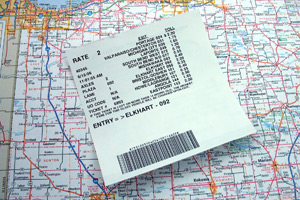Indiana Toll Road Seeks Bankruptcy as Traffic Declines

The operator of the Indiana Toll Road, owned by affiliates of Macquarie Group Ltd. and Ferrovial SA, sought bankruptcy protection with a creditor-supported restructuring plan after dwindling traffic soured a $3.8 billion bet on a 75-year lease.
The company listed assets and liabilities of more than $1 billion each in its Chapter 11 filing Sept. 21 in Chicago bankruptcy court. The company has an estimated $6.3 billion in secured obligations when including projected amounts of interest through next August, according to court papers.
“The global economic recession stifled interstate commerce, which depressed the interstate trucking activity that accounts for a significant part of the toll road’s revenues,” Fernando Redondo, the company’s CEO, said in a court filing.
The Indiana road company isn’t the first to seek creditor protection since the financial crisis. Operators of the South Bay Expressway, a 10-mile toll road near San Diego, and the 16-mile Southern Connector in Greenville County, South Carolina, each filed for bankruptcy in 2010 after experiencing low traffic.
Even though earnings “increased every year between 2008 and 2013, they were lower than projected,” forcing the company to devote an ever-greater share of operating income to debt service, Redondo said.
Open since 1956, the road spans 157 miles across northern Indiana, connecting Chicago to major East Coast traffic arteries, according to its website. It took more than 6,200 engineers and laborers 786 days to complete the project.
ITR Concession Co. acquired the rights to operate the road in 2006 from the Indiana Finance Authority, according to a company statement.
The Indiana company said it put together a reorganization plan that has the support of more than 87% of its senior-secured debt-holders and unanimous acceptance from its equity owners.
Under the proposal, the company would either be sold through a competitive process or restructured with $2.75 billion in new debt with almost all the equity going to the secured creditors, according to the disclosure statement describing the plan.
Since it already has the necessary support from stakeholders, the company asked the court to approve the reorganization plan within 30 days. The sale process or restructuring could run until next August, after the company exits court protection.
In either scenario, the ITR Concession’s unsecured creditors owed about $8 million, its only other listed debt, which will be paid in full.
Traffic volume has plunged by about 42% on the Indiana highway since ITR took over operations eight years ago, according to data on the website of Macquarie Atlas, the unit that owns ITR.
First-half revenue increased about 5.2% from last year, including a 7.2% jump in the quarter ended in June, according to a Macquarie Atlas statement. Traffic gained only a third of 1% over last year’s first-half figures, with a 3.2% drop in the first quarter due to bad weather.
Toll rates for passenger cars paying cash increased 30 cents to $10 on July 1 for a full 157-mile trip, according to an ITR statement. Rates for a typical semi-trailer truck rose $1 to $39.70.
Travelers using an electronic toll-collection system pay $4.65 for a full trip, the same rate since 1985. Electronic collection accounts for more than 70% of toll receipts, according to the Macquarie Atlas documents.
An Indiana Finance Authority agreement that runs through June 2016 freezes toll rates for electronic users and refunds ITR Concession the difference between the electronic rate and the cash price.
The company borrowed more than $3.2 billion to fund the acquisition of the right to operate the highway for 75 years, a $150 million liquidity facility to fund early period interest payments and $665 million to fund capital expenditures through June 2015, according to Macquarie Atlas documents.
The liquidity facility is fully drawn, and about $454 million of the capital spending facility has been drawn as of December.
ITR Concession has an estimated $2.15 billion secured liability for so-called swaps transactions used to protect against interest rate fluctuations. As interest rates dropped after the recession and governments took action to stimulate lending, the hedging agreement turned into a liability for the company. The obligation came due after a missed $102 million interest payment in June.
ITR Concession is jointly owned by Madrid-based Ferrovial’s Cintra Concesiones and two affiliates of Sydney-based Macquarie, Australia’s largest investment bank.




